高考英语非谓语动词集萃
图片预览
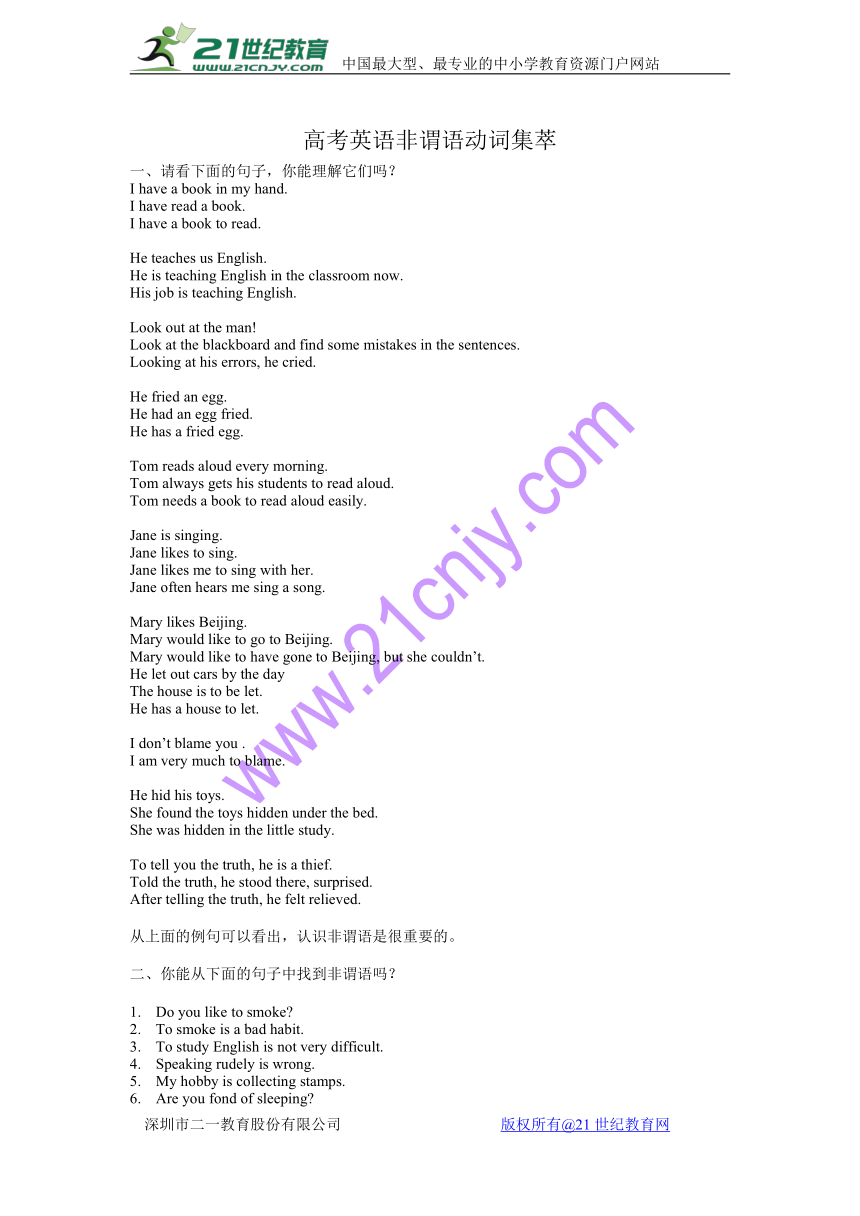
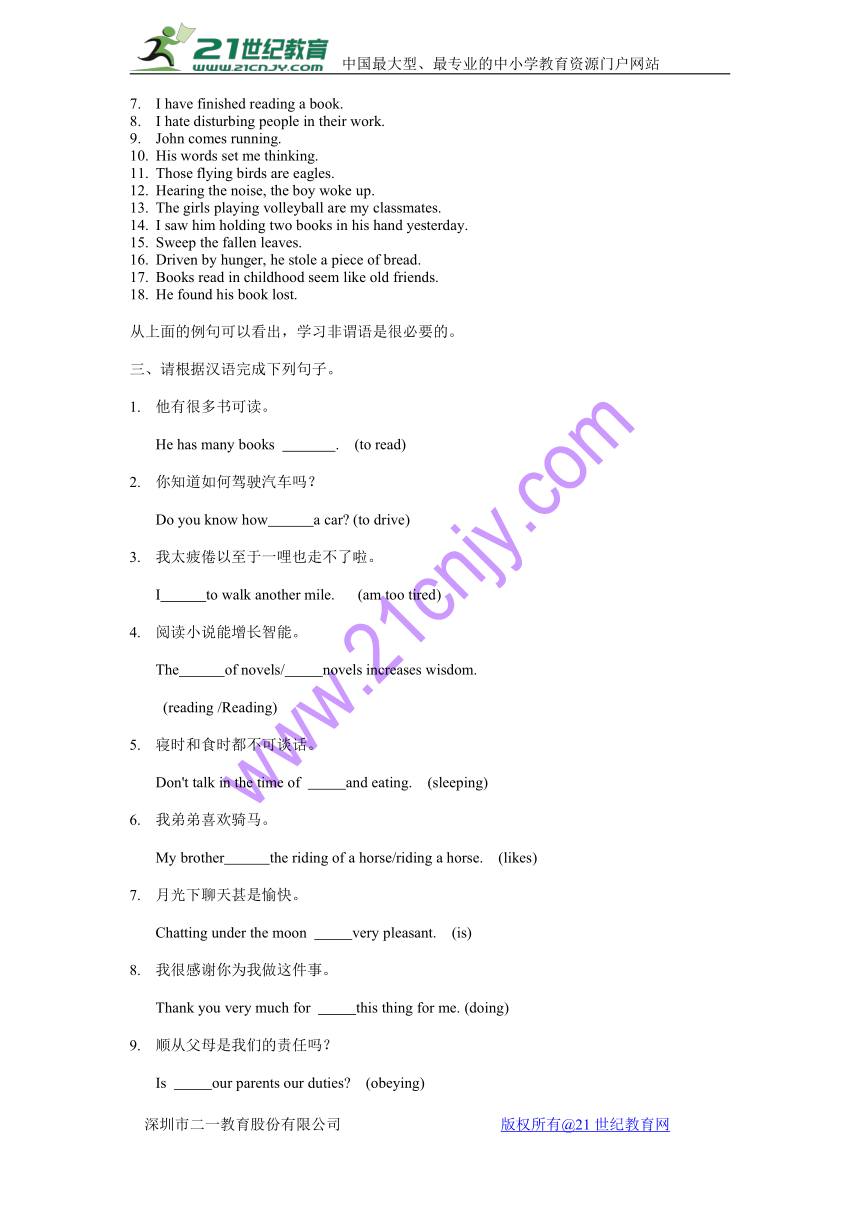
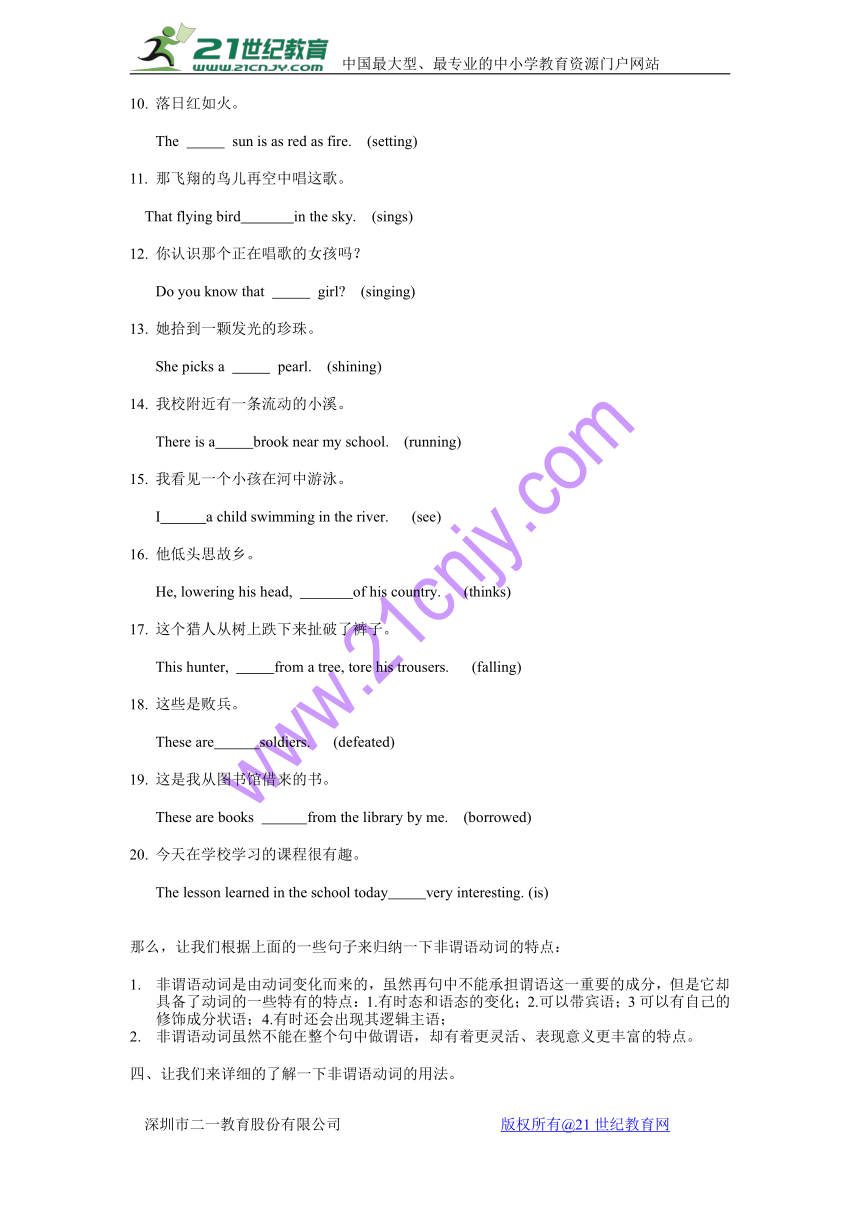
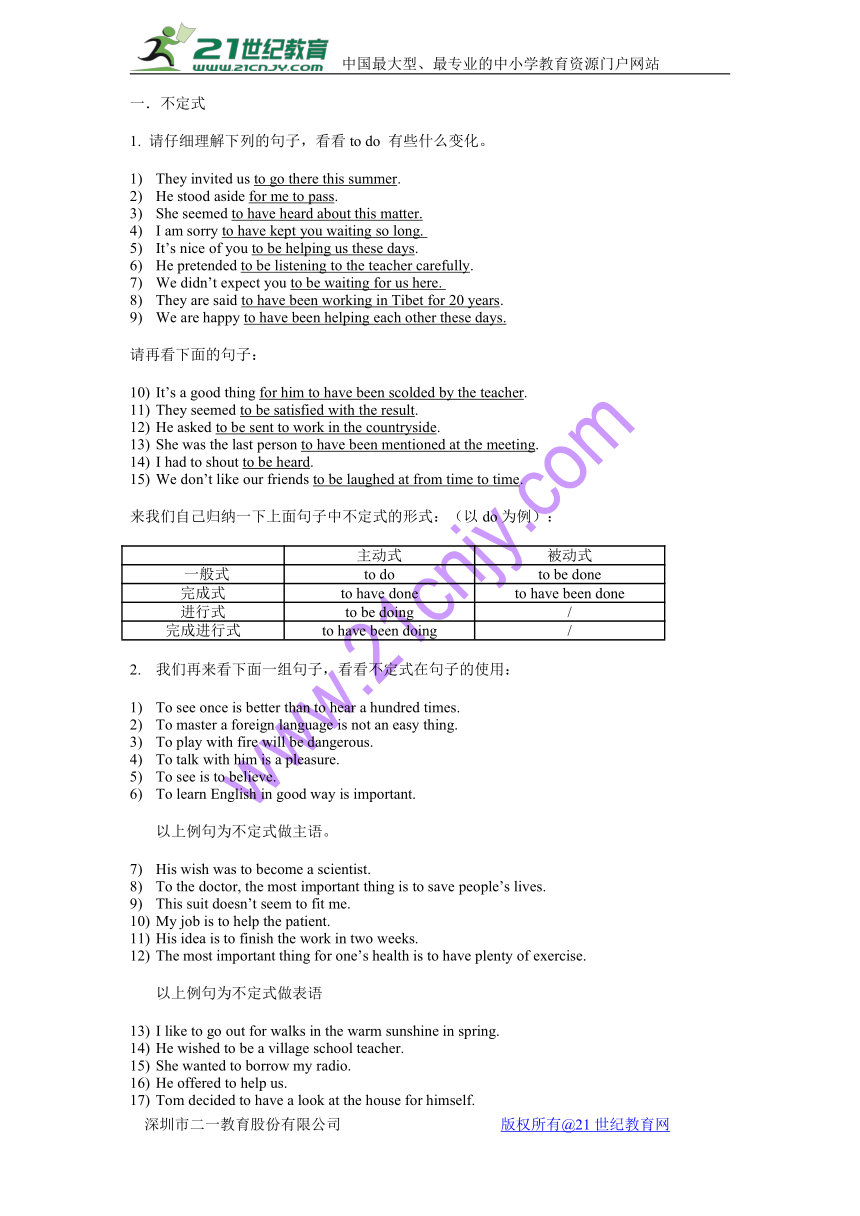
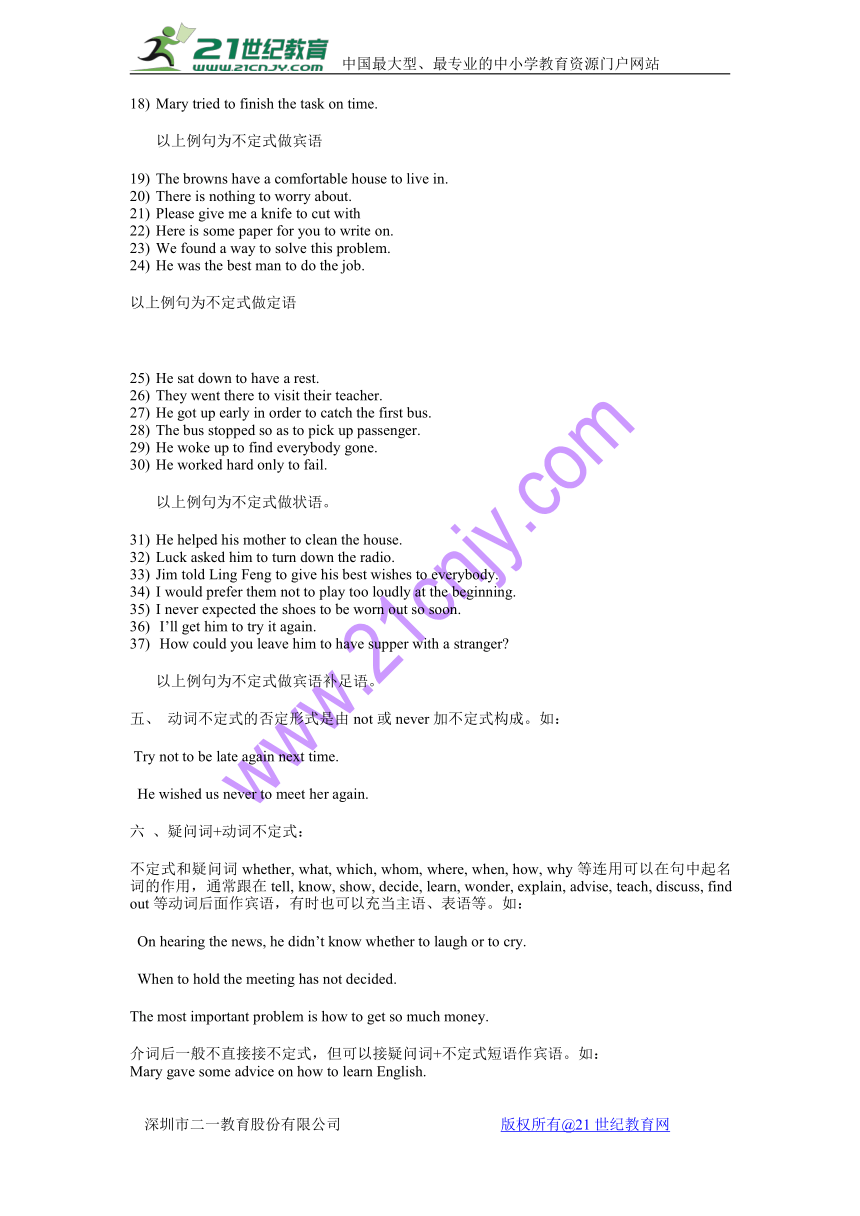
文档简介
高考英语非谓语动词集萃
一、请看下面的句子,你能理解它们吗?
I have a book in my hand.
I have read a book.
I have a book to read.
He teaches us English.
He is teaching English in the classroom now.
His job is teaching English.
Look out at the man!
Look at the blackboard and find some mistakes in the sentences.21世纪教育网版权所有
Looking at his errors, he cried.
He fried an egg.
He had an egg fried.
He has a fried egg.
Tom reads aloud every morning.
Tom always gets his students to read aloud.
Tom needs a book to read aloud easily.
Jane is singing.
Jane likes to sing.
Jane likes me to sing with her.
Jane often hears me sing a song.
Mary likes Beijing.
Mary would like to go to Beijing.
Mary would like to have gone to Beijing, but she couldn’t.21教育网
He let out cars by the day
The house is to be let.
He has a house to let.
I don’t blame you .
I am very much to blame.
He hid his toys.
She found the toys hidden under the bed.
She was hidden in the little study.
To tell you the truth, he is a thief.
Told the truth, he stood there, surprised.
After telling the truth, he felt relieved.
从上面的例句可以看出,认识非谓语是很重要的。
二、你能从下面的句子中找到非谓语吗?
Do you like to smoke?
To smoke is a bad habit.
To study English is not very difficult.
Speaking rudely is wrong.
My hobby is collecting stamps.
Are you fond of sleeping?
I have finished reading a book.
I hate disturbing people in their work.
John comes running.
His words set me thinking.
Those flying birds are eagles.
Hearing the noise, the boy woke up.
The girls playing volleyball are my classmates.
I saw him holding two books in his hand yesterday. 21cnjy.com
Sweep the fallen leaves.
Driven by hunger, he stole a piece of bread.
Books read in childhood seem like old friends.
He found his book lost.
从上面的例句可以看出,学习非谓语是很必要的。
三、请根据汉语完成下列句子。
他有很多书可读。
He has many books . (to read)
你知道如何驾驶汽车吗?
Do you know how a car? (to drive)
我太疲倦以至于一哩也走不了啦。
I to walk another mile. (am too tired)
阅读小说能增长智能。
The of novels/ novels increases wisdom. 21·cn·jy·com
(reading /Reading)
寝时和食时都不可谈话。
Don't talk in the time of and eating. (sleeping)www.21-cn-jy.com
我弟弟喜欢骑马。
My brother the riding of a horse/riding a horse. (likes)2·1·c·n·j·y
月光下聊天甚是愉快。
Chatting under the moon very pleasant. (is)
我很感谢你为我做这件事。
Thank you very much for this thing for me. (doing)【来源:21·世纪·教育·网】
顺从父母是我们的责任吗?
Is our parents our duties? (obeying)
落日红如火。
The sun is as red as fire. (setting)
那飞翔的鸟儿再空中唱这歌。
That flying bird in the sky. (sings)
你认识那个正在唱歌的女孩吗?
Do you know that girl? (singing)
她拾到一颗发光的珍珠。
She picks a pearl. (shining)
我校附近有一条流动的小溪。
There is a brook near my school. (running)
我看见一个小孩在河中游泳。
I a child swimming in the river. (see)
他低头思故乡。
He, lowering his head, of his country. (thinks)21·世纪*教育网
这个猎人从树上跌下来扯破了裤子。
This hunter, from a tree, tore his trousers. (falling)
这些是败兵。
These are soldiers. (defeated)
这是我从图书馆借来的书。
These are books from the library by me. (borrowed)
今天在学校学习的课程很有趣。
The lesson learned in the school today very interesting. (is)
那么,让我们根据上面的一些句子来归纳一下非谓语动词的特点:
非谓语动词是由动词变化而来的,虽然再句中不能承担谓语这一重要的成分,但是它却具备了动词的一些特有的特点:1.有时态和语态的变化;2.可以带宾语;3可以有自己的修饰成分状语;4.有时还会出现其逻辑主语;
非谓语动词虽然不能在整个句中做谓语,却有着更灵活、表现意义更丰富的特点。
四、让我们来详细的了解一下非谓语动词的用法。
一.不定式
1. 请仔细理解下列的句子,看看to do 有些什么变化。
They invited us to go there this summer.??
He stood aside for me to pass.
She seemed to have heard about this matter.??
I am sorry to have kept you waiting so long.??
It’s nice of you to be helping us these days.?
He pretended to be listening to the teacher carefully.??
We didn’t expect you to be waiting for us here.??
They are said to have been working in Tibet for 20 years.??
We are happy to have been helping each other these days.?? ????
请再看下面的句子:?
It’s a good thing for him to have been scolded by the teacher.??
They seemed to be satisfied with the result.?
He asked to be sent to work in the countryside.??
She was the last person to have been mentioned at the meeting.?
I had to shout to be heard.??
We don’t like our friends to be laughed at from time to time.??
来我们自己归纳一下上面句子中不定式的形式:(以do为例):
?
主动式
被动式
一般式
to do
to be done
完成式
to have done
to have been done
进行式
to be doing
/
完成进行式
to have been doing
/
我们再来看下面一组句子,看看不定式在句子的使用:
To see once is better than to hear a hundred times.?
To master a foreign language is not an easy thing.
To play with fire will be dangerous.
To talk with him is a pleasure.
To see is to believe.
To learn English in good way is important.
以上例句为不定式做主语。
His wish was to become a scientist.
To the doctor, the most important thing is to save people’s lives.
This suit doesn’t seem to fit me.
My job is to help the patient.
His idea is to finish the work in two weeks.
The most important thing for one’s health is to have plenty of exercise.
以上例句为不定式做表语
I like to go out for walks in the warm sunshine in spring.
He wished to be a village school teacher.
She wanted to borrow my radio.
He offered to help us.
Tom decided to have a look at the house for himself.
Mary tried to finish the task on time.
以上例句为不定式做宾语
The browns have a comfortable house to live in.
There is nothing to worry about.
Please give me a knife to cut with
Here is some paper for you to write on.
We found a way to solve this problem.
He was the best man to do the job.
以上例句为不定式做定语
He sat down to have a rest.
They went there to visit their teacher.
He got up early in order to catch the first bus.
The bus stopped so as to pick up passenger.
He woke up to find everybody gone.
He worked hard only to fail.
以上例句为不定式做状语。
He helped his mother to clean the house.
Luck asked him to turn down the radio.
Jim told Ling Feng to give his best wishes to everybody.
I would prefer them not to play too loudly at the beginning.
I never expected the shoes to be worn out so soon.?
?I’ll get him to try it again.??
?How could you leave him to have supper with a stranger?
以上例句为不定式做宾语补足语。
五、??动词不定式的否定形式是由not或never加不定式构成。如:
?Try not to be late again next time.?
He wished us never to meet her again.??
六 、疑问词+动词不定式:
不定式和疑问词whether, what, which, whom, where, when, how, why等连用可以在句中起名词的作用,通常跟在tell, know, show, decide, learn, wonder, explain, advise, teach, discuss, find out等动词后面作宾语,有时也可以充当主语、表语等。如:
On hearing the news, he didn’t know whether to laugh or to cry.??
When to hold the meeting has not decided.?
The most important problem is how to get so much money.??
介词后一般不直接接不定式,但可以接疑问词+不定式短语作宾语。如: Mary gave some advice on how to learn English.??
I have no idea of how to do it.??
七?、不定式的复合结构??
不定式复合结构的构成
不定式在使用时通常有自己的逻辑主语,一般可以是句子的主语或宾语,或者由物主代词暗示出来。如:
They plan to build a hotel.??
His father sent him abroad to study literature.??
I could see her eagerness to go abroad.??
但有时需要明确表示出不定式的逻辑主语(即不定式动作的执行者),此时一般用for/of +名词(代词)短语+不定式来构成不定式的复合结构。如:
It’s expensive for people to use electricity for cooking.???
?It’s careless of you to make such a mistake.?????
2)???不定式复合结构的语法作用 不定式的复合结构在句中可以做主语、宾语、表语、状语、定语。
1.不定式的复合结构作主语、宾语,通常用it 作形式主语或形式宾语来代替不定式的复合结构。如:
It’s necessary for the goods to be packed in strong cases.???
They thought it impossible for us to find the lost child in the darkness. 2. 不定式的复合结构作表语、状语、定语。如: That’s for you to decide.??
For the test to be passed, the students should work harder than before.
I have some books for you to read.??
动名词(GERUND)
我们先看看下面的句子:
The girl is singing a song.
The girl singing now is my sister.
Singing is one of her hobbies.
从上面句子可以看出一个动词加上ing后不都是进行时态,也可具有名词性,这时我们就可叫它为动名词。
二、 看下面的句子,找找动名词。
The happy singing of the birds announces the coming of spring.
We knew the robber was near when we heard a faint rustling(沙沙声) in the bushes.
He is waiting for you at the crossing.
He can see a woman through the opening.
Carelessly writing essays annoys the teacher.
He dislikes being interrupted in his speech.
They couldn't stand being treated like that.
We regret having been unable to inform you of the meeting.
The students' having done the work so well made us very happy.
I heard of his having been chosen to be the coach of the team.
Some of our customers complained of having been treated rudely.
从以上例句可以看出:
?
主动式
被动式
一般式
doing
being done
完成式
having done
having been done
我们再来看下面一组句子,看看动名词在句子的使用:
作主语
1. Listening to music gives me pleasure.
2. Running is good exercise.
3. Walking to school is a good idea.
4. Speaking English is fun. 5. There is no joking about such matters.
6. There is no getting along with him. (简直无法与他相处)
7. Laying eggs is her full time work.
8. Learning new words is very useful to me.
作表语
1. My cat's favorite activity is sleeping.
2. Seeing is believing.
3. His job is teaching.
4. His hobby is collecting stamps.
5. Our job is playing all kinds of music.
6. Reading is learning, but speaking the language is also a kind of learning.
作宾语
作动词/动词短语的宾语
1. I cannot help laughing.
2. You should avoid quarrelling with your sister.
3. You should practice speaking English more.
4. He admitted having stolen the car.
5. The doctor advised eating less and taking more exercise.
6. We don’t allow smoking in the meeting room.
7. He denied knowing anything about it.
8. I don’t enjoy sailing. When I am at sea, I always feel sick.
这类动词还有: dislike 厌恶 admit 接受 repent 后悔 acknowledge 承认 enjoy 享受 escape避免 deny 否认 postpone 延迟 resent 怨恨 mind 介意 miss 错过 risk 冒风险 finish 完成 avoid 避免 delay 耽误 consider 认为 fancy 想象 excuse 原谅 include 包括 imagine 想象 resist 抵制 suggest 建议 …… 还有短语类: keep (on)继续 don't mind 不介意 cannot help 不禁 give up 放弃 put off 延迟 leave off 停止 burst out 闯出 …… 作介词的宾语 1. I'm sorry for giving you so much trouble.
2. The book is worth reading.
3. I reached him by calling his office.
4. The police arrested(逮捕)him for speeding.
5. She is busy (in) correcting her exercises. 6. He spent two hours (in) reading book. 7. There is no use (in) talking with him now. 8. Is it any good (in) taking cold water baths? 9.I have the pleasure of speaking to the famous author.
10. He takes a great interest in studying languages.
11. In spite of doing his best, the pupil was reproached. (In spite of ) 12. Despite coming in time, the visitors were not admitted. (despite) 13. For all his arguing, the teacher could not convince us. (for all) 14. The fireman distinguished himself by doing his duty to the utmost. (by) 15. In sending us the book you proved to be reliable. (In) 16. Instead of blaming the boy, the teacher encouraged him. (instead of ) 17. The girl left without saying a word. (without) 18. The boy was blamed for breaking the window. (for) 19. The children got tired from learning too much. (from) 20. After spending the holidays with us, our nephew went back to England. (after) 21. Before going to bed, I opened the window. (before) 22. On arriving at the station, John was welcomed by his friends. (on) 23. Since leaving school, I have not seen my teacher. (since)
作定语
1. sleeping car 卧车 2. walking stick 手杖
3. printing shop 印务馆 4. reading room 阅读室 5. swimming pool 泳池 6. washing machine 洗衣机 7. dining room 饭厅
可以看出动名词放在所修饰的名词前面作为定语,表示该名词的用途。
四、动名词的逻辑主语
1. His coming here helped us a lot.
2. Tom's escaping from the prison made trouble for the jailer.
3. Do you mind my smoking in the romm?
4. He insisted on Mary's staying there.
5. I cannot say there is no fear of the news spreading among intimate friends.
6. I miss you bringing me cups of tea in the morning.
7. Usually at the beginning of school, the noise of desks being opened and closed, and lessons repeated at the top of the children’s voices could be heard out in the street.
可以看出动名词的逻辑主语是在动名词前加"物主代词(如:my, his...)"或"名词所有格(如:Mary's, Dog's...)"。作为逻辑主语的名词/代词为无生命时,则用普通格: 在下列情况中,不能使用所有格:
1. 代词为 all, both, each, few, several, some, this 等作为逻辑主语时: 1. I remember all of them saying it。
2. 数词、名词化形容词(如 the three, the old...)作逻辑主语时:
1. In spite of the three telling the same story, I could not believe it.
3. 结构中的逻辑主语是名子或短语,或受从句或短语修饰时:
1. Is there any chance of the people in the back of the room talking a little louder? 五、 在动词 need, want, require, deserve 之后的动名词(作为宾语),要用主动 语态来表示被动的意思。 1. The flowers in the garden want watering
2. That's one of those questions that really don't need answering。
另外:有一些动词除了可接动名词外,也可接不定词(infinitive)。例子如下:
1. I prefer living in an apartment. (动词prefer接动名词 living) 2. I prefer to live in an apartment. (动词prefer接不定词 to live) 像上面两个句子的意思没什么不同。如 prefer 这一类的动词还有:
allow deserve neglect attempt fear omit begin hate permit bother intend cease like recommend continue love start stop forget regret propose try continue remember need ……
请翻译下列的句子:
The girl singing now is my sister.
Jack told us the exciting news.
China is a developing country.
We took a sleeping car.
The girl sitting by me is my daughter.
A good teacher must have a pleasing voice.
从以上例句可以看出:v+ing在这些句子中具有描写性、修饰性。这时我们把v+ing 叫为现在分词。
一、请看下列画横线的词。
China is a developing country.
The girl singing for us is ten years old.
The main road being built will be completed next year.
I saw him being beaten by a group of children.
Having received a latter, I knew everything is all right.
Having had my supper, I went out for a walk.
Having been introduced to each other, we began to work.
Having been given the wrong address, I failed to find his house.
从以上例句可以看出:
?
主动式
被动式
一般式
doing
being done
完成式
having done
having been done
我们再来看下面一组句子,看看现在分词在句子的使用:
The?story?is?interesting.? ?The?match?is?exciting.?
The news is surprising.
The film is moving.
The speech is inspiring.
从以上句子可以看出分词可以再句子中作表语?
a running boy
the girl standing there??
the exciting news
a boring speech
He rushed into the burning house.
The child standing over there is my brother.
The room facing south is our classroom.
从以上句子可以看出分词可以再句子中作定语
Walking?in?the?street, I?saw?him.
Working?hard, you?will?succeed.?
Being?ill, she?stayed?at?home.?
His?friend?died, leaving?him?a?lot?of?money
He?is?standing?there, singing.
Having known that he won the match, he threw the cap into the sky. Seeing the teacher is coming, t he students stopped playing. Coming into the room, he lied on his bed.
从以上句子可以看出分词可以再句子中作状语
I saw him walking in the street.
I heard them singing in the classroom.
We found the boy sleeping.
Don't?have?the?students?studying?all?day.?
从以上句子可以看出分词可以再句子中作宾语补足语
三、分词的否定形式。not + 分词 Not knowing what to do next, she stopped to wait.
Not having finished the homework, the little girl doesn't dare to go to school.
四、作独立成分? generally?/frankly/honestly speaking,
Judging?from/by?, 五、现在分词的独立主格? 又叫独立结构。是一个独立于句子成分之外的独特结构形式。独立主格结构可分为两部分,一部分是名词或代词(主格),起着逻辑主语的作用;另一部分由形容词、副词、名词、分词、不定式、介词短语等构成,表示前面名词或代词的状态、状况或动作,? 在句中作状语。
eg. Winter?coming,it?gets?colder?and?colder.
The?boy?lay?on?the?ground,his?eyes?closed?and?his?hands?trembling.
六、请根句汉语填空
1. his address, I could do nothing but stay at home and wait. ???? 不知道他的地址,我只好在家里等着。(Not knowing)
2. , he was interested in books.??
作为一个学生,他对书本很感兴趣。(Being a student)
3.The question is very important.???
正在被讨论的问题很重要。(being discussed)
4. by the teacher, he gave up smoking. ????
?? 被老师批评以后,他把烟戒了。(Having been criticized)
5.Who is the comrade ???
站在门边的同志是谁?(standing by the door)
6.They lived in a house .??
他们住在一所朝南的房子里。(facing south)
7.When she appeared, John, , ran to her with joy.??? ? ???
当她出现的时候,约翰穿着一件又脏又破的大衣高兴地跑了过去。(wearing a dirty and worn-out overcoat)
8. , she remembered her childhood.????
? 看到那些画,他想起了她的童年。(Seeing those pictures)
9. , the young people started walking slowly.
??????年轻人跟在老人的后面开始慢慢地走起来。?
(Following the old man)
10.I noticed a man when I got off the car. ??????我下车的时候注意到一个男人匆匆忙忙地从银行里跑出来。
(running out of the bank)
11.Last night the shopkeeper caught a child in the shop. ??????昨晚,店主在商店里抓到一个小孩在偷东西。(stealing some food)
12.We were kept .??
让我们等了好长时间。(waiting for quite a long time)
一、请仔细阅读下列句子
The girl singing now is my sister.
The song sung by the girl is sweet.
Jack told us the exciting news.
The excited people are jumping with joy.
China is a developing country.
The United States is a developed country.
A good teacher must have a pleasing voice.
The teacher found his students pleased with their performance.
Seeing the picture, he thought of his childhood.
Seen from the hill, the city looks more beautiful.
从以上例句可以看出:v+ed 和现在分词一样在句子起描写、修饰的作用,只是意义和逻辑关系都发生了变化。下面我们仔细的看看v+ed(过去分词)的用法。
过去分词在句子的使用:
We were so bored that we couldn’t help yawning.
She felt confused, and even frightened.
They were very pleased with the girl.
I’m satisfied with your answer.
He is not interested in research.
This article is very well typed.
You shouldn’t get up if you’re badly hurt.
从以上句子可以看出过去分词可以再句子中作表语?,同时表示主语的状态或感受。
2)
She has a pleased look on her face.
The teacher gave us a satisfied smile.
cooked food a written report
fried eggs boiled water
frozen food armed forces
required courses finished products
a forced smile
What’s the language spoken in that country?
They’re problem left over by history.
The play put on by the teachers was a big success.
Is there anybody injured?
Do you know the number of books ordered?
从以上句子可以看出过去分词可以再句子中作定语,同时与所修饰的词之间是被动关系。另外,一些不及物动词的过去分词表示所修饰的词的状态。
the risen sun new arrived visitors fallen leaves
3)
Seen from the hill, the city looks magnificent.
=If the city is seen from the hill, the city looks magnificent.
Given more time, I would finish the work better.
=If I was given more time, I would finish the work better.
They came in, followed by some children.
=They came in, while they are followed by some children.
Depressed, he went to see his elder sister.
=Because he felt depressed, he went to see his elder sister.
When treated with kindness, he was very friendly.
=When he was treated with kindness, he was very friendly
从以上句子可以看出过去分词可以在句子中作状语,相当于状语从句的省略。
4)
I will have the clothes washed tomorrow.
When they get back home, they found the room robbed.
The other students in the class keep their eyes closed.
Many towns and villages had their water supply cut off because there were no electricity.
We are going to have/get the tables painted different colours.
I can see it fastened to a nail next to the hole in the wall.
从以上句子可以看出过去分词可以在句子中作宾补,与宾语之间有被动关系。
过去分词作宾语的补语, 常接在某些动词后面:1)感官动词:see hear watch feel notice observe keep find listen?to look?at?? 2)使役动词:have get catch leave set ?
When will you go to the hospital and have your tooth examined??
When you are making a speech, you should speak louder to make yourself heard.
当这类句子变成被动语态时,过去分词用作主语补语。
One of the glasses was found broken.??
They should be kept informed of the situation there.?
动词have后所接的三种宾语补语:
1)?have somebody/something do something
?I had the workers do the job for me.?? ?????
Jim often has his father help him with his homework. ????
2)have somebody /something doing something?
They had the tractor working all the time.??
We won’t have the child talking to his mother like that.?
3) have somebody/something done
①主语让别人做某事,强调主语的意志。如:
He had his hair cut yesterday.?
Later on the center had a great many new trees planted.
②主语遭到某种不幸或陷入恶劣的环境,说明宾语的一种无意识的被动行为。如: He had his leg broken in the match last month.
He had one eye lost in the war.??
四、非谓语动词的被动式作定语的三种形式: the bridge to be built?? 将要建造的桥? (表示将来的动作) the bridge being built?? 正在建造的桥? (表示正在进行的动作) the bridge built??? 造好的桥? (表示完成的动作) 五、 过去分词和现在分词作表语的区别:
过去分词作表语通常表示主语所处的状态或感受,而现在分词作表语多表示主语所具有的特征,如:
Hearing the news, we felt very surprised.??
The news is very surprising.??
They were frightened to hear the frightening sound.
At the sight of the moving scene, all the people present were moved to tears.
英语中这样的分词还有很多,如:amusing, amused; encouraging, encouraged; disappointing, disappointed; exciting, excited; puzzling, puzzled; satisfying, satisfied; worrying, worried; tiring, tired; pleasing, pleased; interesting, interested; astonishing, astonished等。 六、 过去分词和现在分词作定语的区别:
试比较下面几组短语: boiled water开水??? boiling water正沸腾的水 developed countries发展的国家???? developing countries发展中国家 fallen leaves落叶??? falling leaves 正在飘落的叶子 changed condition改变了的情况?? ? changing condition变化着的情况
???由此可见,过去分词作定语通常表示完成的或被动的动作;而现在分词作定语可以表示正在进行的主动的动作。
请选择正确的选项完成下列句子。
1.????I’m going to have my car ? ???. A. to be fixed???????????????? B. to fix?????????????
??? C. fixed????????????????????????????D. to fix 2.?? What’s the language ?? ????in Germany? A.speaking??????????????????????B. spoken?????????????
C. be spoken????????????????? D. to speak 3.? ???????some officials, Napoleon inspected his army. A. Followed?????????B. Followed by??????????
C.Being followed???D.having been followed by
4.? He had his leg ???? ????in the match yesterday. A. to break??????????????????????????B. broken???????????
C. break???????????????????????????????D. breaking
5.?Most of the people ???? ???to the party were famous scientists. A. invited?????????????????????????B. to invite???????????
?C. being invited???????????? D. inviting
6. ???????more attention, the trees could have grown better.
A. Given????????????????????????????B. To give???????????
?C. Giving??????????????????????????D. Having given
7.?The murderer was brought in, with his hands ? ????behind his back.
A. being tied??????????????????B. having tied????????
C. to be tied????????????????????D. tied
8. The computer center, ??????? ?last year, is very popular among the students in this school.
A. open?????????????????????????????????B. opening???????
C. having opened???????????????? D. opened
9.????????in thought, he almost ran into the car in front of him.
A. Losing ????????????????????? B. Having lost??????
C. Lost?????????????????????????????D. To lose
10.?? The Olympic Games, ??????? ?in 776BC, didn’t include women
players until 1912.
A.first played?????B.tobe first played??????????????
C. first playing???D. to be first played
11.?? Don’t get ??? ???in the rain.
A. to be caught????????????????????B. catching????????
C. to catch???????????????????????? D. caught
12.?? I found a car ???????????? ?in a pool by the side of the road.
A. to be stuck??????????????????????B. stuck???????????
C. sticking?????????????????????????? D. stick
13. ---By the way, when did you get your bedroom ????? ????????????
---Last week.
A. to paint???????????????????????B. painted????????
C. painting??????????????????????D. to be painted
14.?? The children were found ?? ???in the cave. A. trapping????????????????????????B. trapped??????????
C. to be trapped?????????????????D. be trapped
15.?? They found a ??????????? ??old woman ????????????? ??on the ground when
the door was broken down.
A. dying, lying???????????????? B. dead, lied????????
?? C. death, laying???????????????D. died, lain
16.?On a ??? ????morning the little girl was found ???????? ??at the corner of
the street.
A. freezing, freezing?B.freezing, frozen???????
?? C. frozen, frozen???????D. frozen, freezing
17.?? No one enjoys ??? ????fun of in public.
A. making ?????????????????????B. being made???????
C. to be made????????????????? D. to make
18.?? Before he came to London, he had never heard a single English
word ??? ??.
A. speaking?????????????????????????B. spoken??????????
?C. to be spoken????????????????????D. speak
19.?? ???????from space, the earth, with water ????????????? ??seventy percent of
its surface, looks like a blue ball.
A. Seen, covered????????B. Seen, covering???????
? C. Seeing, covering?????D. Seeing, covered
20. ?An ???????????? ?crowd is awaiting the arrival of the film star.
A. excited??????????????????????B. exciting???????????
C. excite??????????????????????????D. excitedly
1---5??C B?B?B?A??6---10?A?D?D C A 11—15?D?B?B?B?A?16--20B B B B?A
